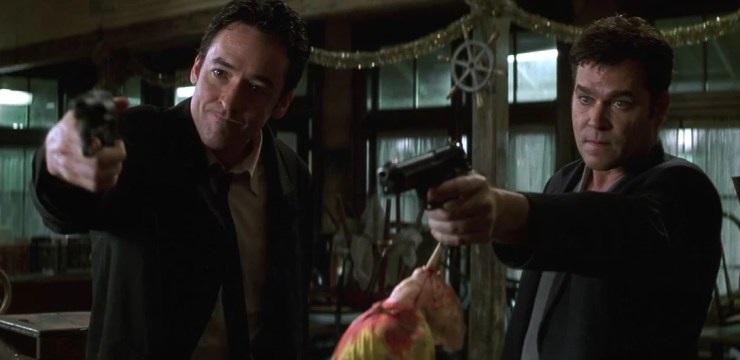Goodfellas was, justifiably, the first word in nearly every headline that ran upon Ray Liotta‘s passing last week; any actor who can hold their own opposite Robert De Niro and Joe Pesci in a Martin Scorsese classic deserves the recognition. But, in addition to excelling at the tough guy persona, he also had a vulnerable side as well as comedic chops. As a result, the list of his memorable performances is impressively long.
He earned a Golden Globe nomination for his first supporting role in Something Wild; he embodied the ghost of Shoeless Joe Jackson in Field of Dreams; he flew off the handle as an unhinged cop in Unlawful Entry; he ate his own brain in Hannibal; he appeared in two Muppet movies (Muppets from Space and Muppets Most Wanted); he played a pivotal role as Ryan Reynolds’ partner in Smokin’ Aces; he duked it out with Seth Rogen to the tune of Queen in Observe and Report; and he voiced the protagonist in one of the most celebrated video games of all time, Grand Theft Auto: Vice City, to name a few.
But the Ray Liotta movie I find myself thinking about most is 2003’s Identity, in which he plays one of several people left stranded at a desolate Nevada motel due to torrential rain only to be picked off one by one by an unknown killer. It’s essentially a modern retelling of Agatha Christie’s influential 1939 whodunit And Then There Were None (which a character directly references in the movie) until a seismic twist recontextualizes everything.
The guests include limo driver Ed (John Cusack), corrections officer Rhodes (Liotta) and his prisoner transport Robert Maine (Jake Busey, Starship Troopers), sex worker Paris (Amanda Peet, The X-Files: I Want to Believe), diva actress Caroline (Rebecca De Mornay, Risky Business), young newlyweds Lou (William Lee Scott, The Butterfly Effect) and Ginny (Clea DuVall, The Faculty), parents George (John C. McGinley, Scrubs) and Alice (Leila Kenzle, Mad About You) with young son Timmy (Bret Loehr), and motel manager Larry (John Hawkes, Winter’s Bone).
The plethora of characters are juggled deftly, each one easily defined by their quirks following brisk introductions via keenly edited (courtesy of Academy Award winner David Brenner) flashbacks showing their intersecting trajectories. As the mystery builds, the B-story concerns an informal trial for death row inmate Malcolm Rivers (Pruitt Taylor Vince, Constantine), with Alfred Molina (Spider-Man 2) as his psychiatrist and Holmes Osborne (Donnie Darko) as the judge.
Identity is a breakneck thrill ride that builds Twilight Zone-esque intrigue while ratcheting tension over the course of 90 minutes. The rug is pulled out from under the viewer several times over, most notably with a clever third-act twist that could astonish M. Night Shyamalan and again with a shocking button right before the credits roll. Like any good mystery, the clues are hidden in plain sight, making repeat viewings rewarding.
James Mangold (Logan, Ford v Ferrari) was a somewhat unexpected choice to direct Identity in 2003, coming off back-to-back lauded dramas with Girl, Interrupted and Kate & Leopold, but he does so with gusto. Despite being contained to a single location, the visuals never become tiresome. Working with director of photography Phedon Papamichael (The Pursuit of Happyness, Ford v Ferrari), Mangold gives the glossy picture a neo-noir atmosphere with shadowy cinematography and a never-ending stream of rain.
Similarly surprising is the fact that the tightly-plotted script was written by Michael Cooney, whose only earlier work of note is writing and directing the 1997 killer snowman cult classic Jack Frost. He utilizes his genre background by injecting a slasher movie mentality into the psychological thriller. As Cusack notes in a making-of featurette, “In a lot of films, you have to do stuff where character motivates plot. This is one where, in a way, the actors are kind of these elegant chess pieces; the writer and director are weaving these different stories.”
From screen veterans to character actors, the eccentric ensemble plays well off one another. Cusack sparkles as the flawed hero. Liotta, reuniting with Mangold after working together on 1997’s Cop Land, delivers a layered performance. Peet embodies the independent woman who refuses to be mistreated. A bespectacled McGinley plays ineffectually shaken well. Busey is effortlessly unsavory. Vince, who starred in Mangold’s 1995 debut Heavy, is chilling yet sympathetic.
Angelo Badalamenti (Twin Peaks) was originally hired to compose the soundtrack, only to be replaced by Alan Silvestri. Silvestri’s score is noticeably more subtle than his grandiose work in the likes of Back to the Future, The Avengers, and Forrest Gump, but it’s eerie enough to match the film’s tone. The soundtrack also makes good use of Foo Fighters’ “All My Life” and Bob Dylan’s “I Want You.”
The film was shot in the Los Angeles area on a budget of $28 million. Identity opened at #1 at the box office on April 25, 2003, grossing over $16 million, and went on to earn over $90 million worldwide. It received mixed but generally favorable reviews, sitting at 63% on Rotten Tomatoes. While I can see why it may unravel with the twist for some, I consider it to be a near-perfect thriller, as it ingeniously subverts expectations at every turn with nary a dull moment. It’s currently streaming on Netflix.
The post ‘Identity’ – Heading Back to the Motel to Revisit a Near-Perfect Thriller Nearly 20 Years Later appeared first on Bloody Disgusting!.


